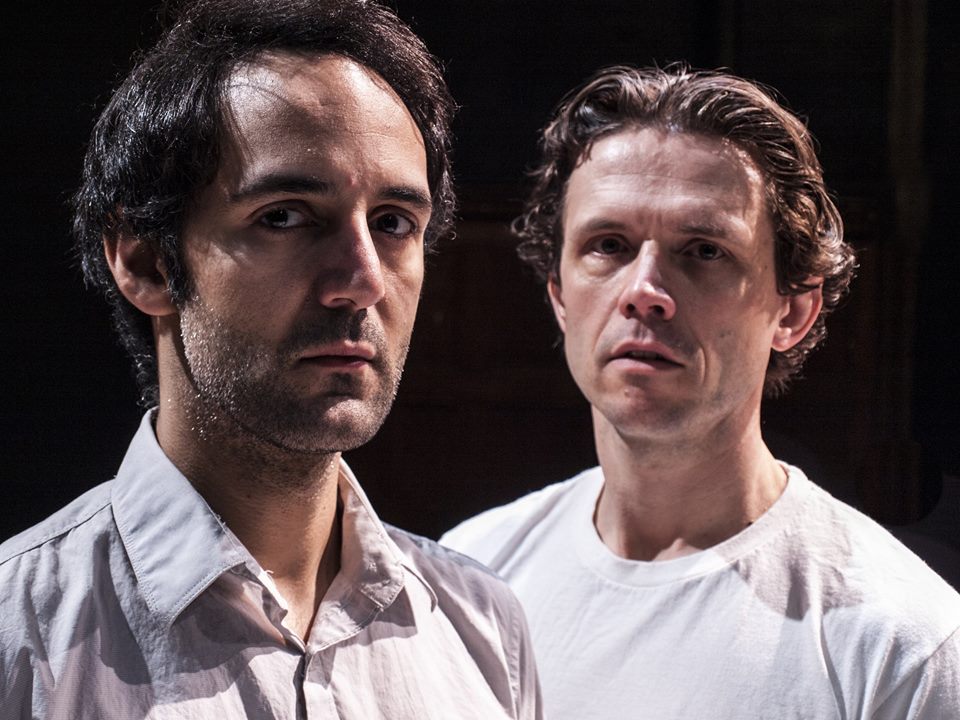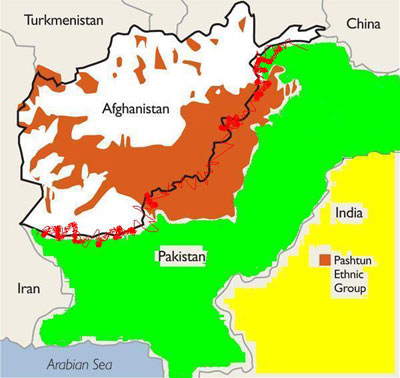
Handsome devils: Nael Nacer as Rahmat, Lewis D. Wheeler as Carlo; Photo courtesy of New Rep/BCAP Facebook page.
Presented by New Repertory Theatre and Boston Center for American Performance (BCAP)
By Walt McGough
Directed by Bridget Kathleen O’Leary
June 14 – 29, 2014
Boston University Theatre – Lane-Comley Studio 210
264 Huntington Avenue
Boston, MA
New Rep on Facebook
BCAP on Facebook
Review by Kitty Drexel
(Boston) President Obama has received flak from all political sides for his decision to back govt.-sourced drone proposals. It has been 5 years and 5 months since the CIA conducted the first strike during Obama’s term and he shortly thereafter ramped up the attacks in Pakistan, Somalia and Yemen. He went so far as to say that “he wrestle[s] with civilian casualties. But, he said, he has a solemn duty and responsibility to keep the American people safe. That’s my most important obligation as President and Commander-in-Chief. And there are individuals and groups out there that are intent on killing Americans — killing American civilians, killing American children, blowing up American planes.” (Huffington Post) While drone attacks have decreased once his numbers started suffering, attacks have not stopped entirely. Clearly, Obama “wrestles” with casualties enough to make a statement but not enough to discontinue drone use.
It is not surprising that drone-related outcry and casualties have influenced the international zeitgeist. It is a wonder that we haven’t seen the effect until now. Pattern of Life examines the direct influence of the US drone program on American soldiers and the civilians they troll. Carlo (Lewis D. Wheeler) is a drone pilot involved in a strike that does not go according to plan. Rahmat (Nael Nacer) is a Pashto teacher literally caught in the crossfire of Carlo’s attack. In a series of monologues and dream sequences, these two men come to terms with their roles in the war.
Lane-Comley Studio theatre is an intimate space that practically seats the audience in the actor’s laps. Director Bridget Kathleen O’Leary takes PoL one step further by staging Carlo and Rahmat in areas normally reserved for the audience alone. The actors break the 4th wall and frequently make direct eye contact. By putting the actors in our midst, O’Leary forces us to endure personal boundary invasions similar to those experienced by drone targets. There are tv screens situated throughout the audience and stage monitor the movements of the actors. As we are watching the stage, it is entirely possible that someone is behind a camera that could be turned on us. None of us are safe.
Wheeler and Nacer give captivating performances. Pattern of Life is comprised of lengthy, emotionally charged monologues that require a great deal of memorization and focus. Walt McGough has not made their time on stage easy. With the exception of only a few dream sequences, they deliver soliloquies to the audiences in long stretches. They rely on their own temerity to keep the play moving. Both characters are often working at odds but as actors Wheeler and Nacer work exceedingly well together. Their imbued character physicalities lend a deeper understanding to the text. They strike an even balance of energy across the stage even as they give and take focus from the audience. They are fascinating to study as technicians and as people.

The area in Brown is the Pashtun Valley. Image courtesy of Google search “Pastun Valley.” This one was used for an 8th grade social studies project. Accurate enough, I suppose.
Drones are used in combat to make attacks easier on military pocketbooks. They are cheaper than both air artillery and the soldiers. They remove our soldiers from war physically and emotionally. Layers of potential humanity are stripped from our side of conflict: military personnel use chatting apps to communicate; nondescript infrared images are transferred electronically to soldiers who don’t know exactly what it is they are seeing. Meanwhile, the other side, in this case Pakistani civilians, are still in the thick of things. Pattern of Life compels us to reconsider acts of violence from the perspective of those directly affected. We are currently sending drones to do our ‘dirty work.’ When we work to conserve monetary resources we actively deplete our human resources.
This production is intended to stir empathy in the audience. It is not a happy go lucky production for families. While it does support our troops currently and previously working their asses off to ensure freedom for most US citizens*, it also respects the struggle of everyone else. Cultures do clash. Please temper your viewing accordingly.
*LGBTQ+, POCs, and women need only apply when it’s convenient. If this pisses you off; congrats! You enjoy more freedoms than the rest of us.
